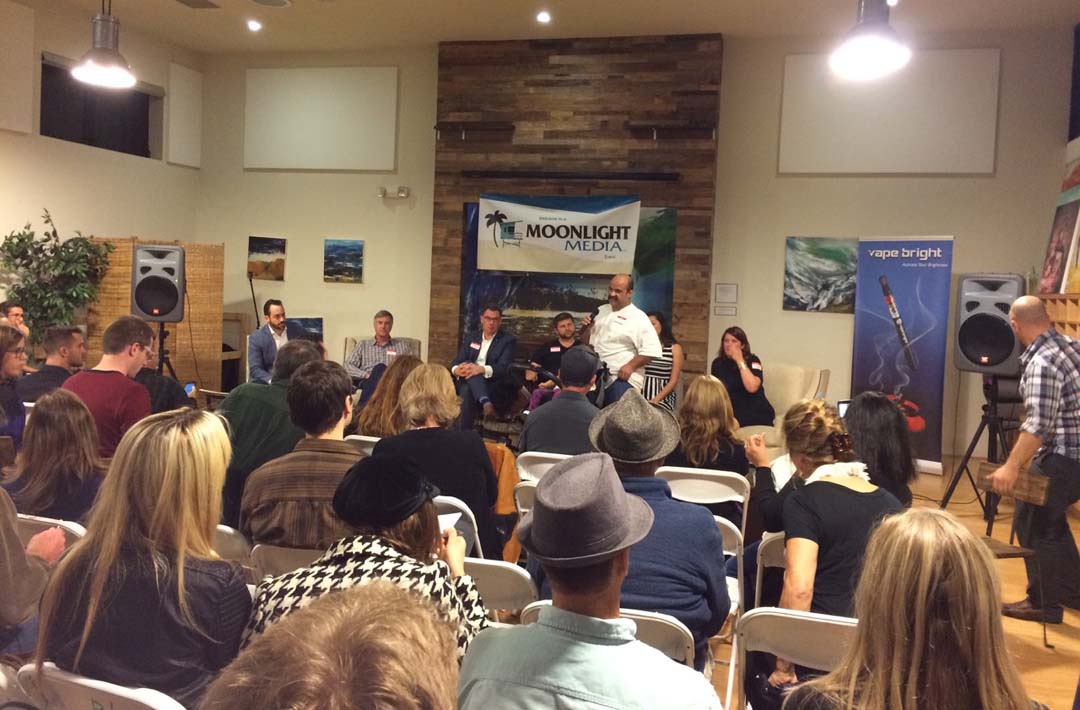ENCINITAS — While the passage of Proposition 64 — the legalization of recreational marijuana use in California — was a watershed moment, more work lies ahead to remove the stigma associated with cannabis use from a perspective of social, land-use, business and political acceptance.
In order to do this, cannabis advocates need to come “out of the closet,” experts said during a recent panel discussion.
Luminaries of the cannabis industry gathered with entrepreneurs, residents and advocates at EVE Encinitas on Feb. 2 for the panel discussion entitled “Prop. 64 Passed, Now What?”
Moderated by Voice of San Diego Editor Scott Lewis, the panel fielded questions from the audience pertaining to the future of cannabis production, entrepreneurship, and use in California.
One of the things the panelists all agreed on was that the perception of cannabis use has to change in order to make headway in these areas.
One of the examples discussed was Encinitas, where data from the County Registrar of Voters shows that the majority of residents were in favor of the passage of Prop. 64, yet two years earlier voted against having licensed medical marijuana dispensaries. Proposition F failed by a 56-44 margin in 2014.
James Schmactenberger, the CEO of Mankind Collective and a front-line advocate on Prop. F, said that it would likely take another voter initiative attempt to legalize collectives in Encinitas.
When asked where the disconnect lied, panelists pointed to local lawmakers, which discouraged and campaigned against the proposition.
“The vast majority of lawmakers I speak of, when you start a conversation with decision makers (about cannabis) the first thing they think of is a reggae flag and a bong, and that is just not the case,” said Anthony Wagner, a San Diego planning commissioner and executive director of the Southern California Responsible Growers Council. “Decision makers need to be educated so they can see cannabis with the same compassion that that father was using for his love and joy, his child.”
Wagner was referring to the event’s spotlight speaker, Brian Higuera, who had made headlines for turning to cannabis oil to save his then-2-year-old daughter, Sadie, who was suffering from Schinzel-Giedion Syndrome, which causes, among other things, relentless seizures, kidney problems and mental retardation.
Higuera credits the switch from pharmaceuticals to cannabis for saving his daughter’s life, after his doctor recommended terminating her life.
“We got our baby back,” Higuera said.
Sapphire Blackwood, a panelist who works in regulatory compliance and licensing, agreed with Wagner that the lack of acceptance comes from that misconception. It is the same misconception, she said, that kept her from being forthright with what she did for a living.
“They are just scared of a plant that is known to heal people,” she said.
Starlight Mundy, the CEO of Rebel Mota, which identifies, fosters and promotes cannabis entrepreneurial brands, said in order to expedite that change, people within the industry must take an activist role.
“Here is the reality: Cannabis business is still an activist issue, it requires you coming out of the closet and having conversations with people who ask stupid (sic) questions about reggae flags and bongs,” Mundy said. “The thing that it takes is our sweet little cousins and our aunties coming out and going ‘I am a normal person, I smoke weed and that is OK.’
“And if you are serious about making money in this industry, you need to be showing up to these Board of Supervisors meetings, you need to be showing up to town council and joining business organizations and making your voice heard,” Mundy continued. “Find the thing that is important to you, whether it is patient’s rights, land use…and talk to your family about it and find a way to have an impact where you are locally because a lot of these decisions are happening by a small margin, and a little more work on our side could sway it in our favor.”



